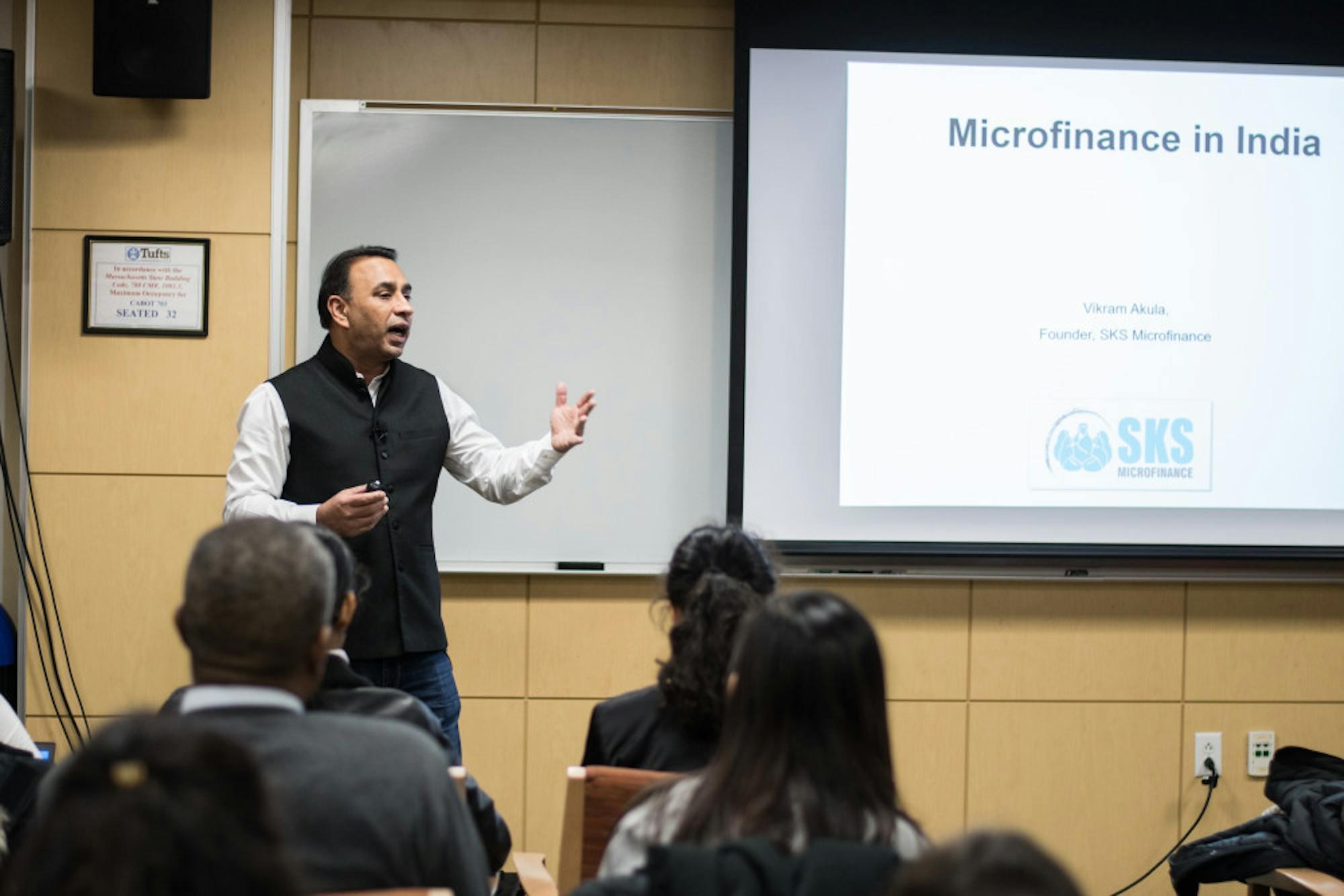Tufts alumnus and Bharat Financial Inclusion Ltd. founder Vikram Akula (LA ’90) discussed the history and legacy of his company, formerly known as SKS Microfinance, an Indian microfinancial firm founded in 1998, on Tuesday night in the Cabot Intercultural Center.
Hosted by the Jonathan M. Tisch College of Civic Life, the Tufts Entrepreneurship Society and The Fletcher School of Law and Diplomacy's Institute for Business in the Global Context, Akula was introduced by Alan Solomont, dean of Tisch College. Solomont explained the continuing connection Akula, a member of Tisch College's board of advisors, shares with the university.
Akula began the talk by tracing the story of Bharat Financial Inclusion Ltd. and his own.
“I was born in India and grew up in upstate New York,” Akula said. “I used to go back to India and witness this tremendous poverty and come back to the wealth of the American suburb. It was a jarring experience.”
Akula said that he saw the need for micofinancing in India while working as a community organizer following his graduation from Tufts.
“I had a chance to work with a number of different programs,” Akula said. “But when I did, all the women we were working with said, ‘This is great, but if you can give us money, we can start small businesses.’”
Akula said that he retained the field approach to micro-lending from other initiatives, that he called the "Grameen model."
“It’s a brilliant model of taking groups of women and having them serve as guarantors for each other, solving the problem of ‘How do you lend to poor women with no collateral?’” Akula said.
Group training was the critical component which led SKS Microfinance to its unparalleled growth, Akula claimed.
“There’s a whole series of dynamic incentives built into the group model,” Akula said. “Loans are issued to only a few women in the group at a time, and payments are small in order to follow their cashflow."
Akula added that this method led to a trend of “right-size borrowing” over time, in which individuals borrow the amount that will be most productive for their goals instead of their maximum eligibility.
“The groups of women don’t take out the maximum amount,” Akula said. “They look at their capacity, they look at their activity, they look at their income and borrow the amount that they need.”
“We found that when the group system is done well, you see this beautiful right-sizing of loans,” Akula said. “And you see impact.”
Bharat Financial Inclusion Ltd. made its Initial Public Offering (IPO) in the summer of 2010, at which time Akula felt prepared to leave the company.
“I felt I had accomplished my goal and could leave the company in good hands,” Akula said.
Akula then described the events that contributed to a collapse of the Indian microfinance industry, following the company's IPO.
“There were tragic incidents of indebtedness and suicides,” Akula said. “Loan officers were beat up, and politicians were telling borrowers not to repay their loans.”
Akula then outlined what he believes to be the primary causes of the collapse in 2010.
“In 2007, when [SKS Microfinance] started to take money from venture capitalists, the world took notice,” Akula said.
New firms that entered microfinance cut costs by decreasing the length and quality of group training, and borrowers increasingly turned to hostility and shame to hold their peers accountable, according to Akula.
Lucy Liu, a second-year master's candidate at the Fletcher School, said that Akula avoided discussing his personal involvement in the crisis while appreciating his approach to the discussion.
“I came because I know that he’s a controversial figure because of all of the suicides,” Liu said. “But he did seem sincere about what he did discuss.”
Answering questions from the audience, Akula said that the collapse of the microfinance industry taught him the importance of responsibility in social entrepreneurship.
“This taught us that social entrepreneurs, usually in fields with no regulation and vulnerable populations, have a responsibility to act responsibly,” Akula said.
According to Akula, regulation was introduced by the Indian government in 2012 after the collapse of most microfinance lenders.
“The [Indian] government created regulations that were badly needed,” Akula said. “Now, there’s one universal bank and ten microlenders.”
Marcia Mendes, a first-year master's candidate at the Fletcher School, said that Akula's discussions and responses to questions from the audience were valuable.
“I was impressed that someone so high-profile would come here and be honest about his exposure to the events that happened, and what went wrong and what went right,” Mendes said.
Tisch College board member discusses Indian microfinance industry

Vikram Akula (LA '90), founder of SKS Microfinancing, now known as Bharat Financial Inclusion Ltd., speaks about microfinance in India at the Micro-Meltdown talk in the Cabot Intercultural Center on Nov. 27.





